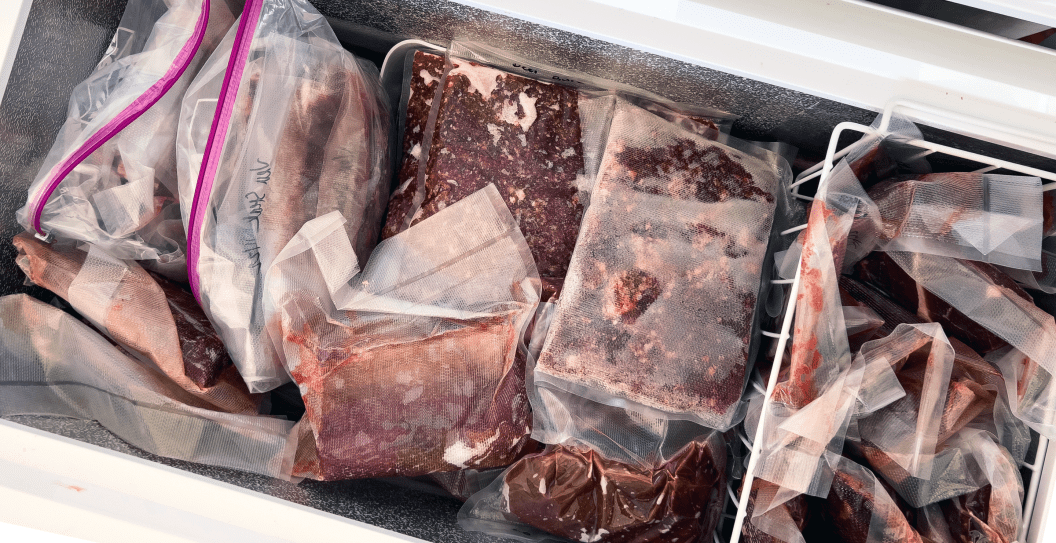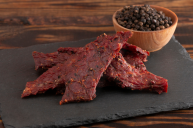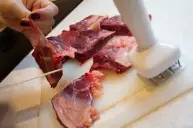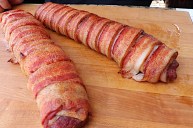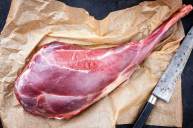Fall is right around the corner, which means hunters across the country are beginning to gear up for deer season. You're probably going through your chest freezer to make room for the fresh venison you'll be putting in there soon, and that cull may include a few tasty venison cuts leftover from last hunting season—or older.
Considering zero waste is among our core tenants as ethical hunters (and you wouldn't want to waste that healthy deer meat), the best method of getting old cuts out of the freezer is, of course, to cook up some delicious venison recipes for dinner tonight.
But just how long is frozen deer meat good for? What's the shelf life of deer meat? Some of us have probably pulled out meat that's been frozen for years and forgotten about, and we wondered how it would taste and if it was safe to eat. No one wants to eat spoiled deer meat. Fortunately, as long as the meat is properly frozen, frozen venison has a very long shelf life, on par with canned venison and venison jerky.
How Long Is Frozen Venison Good For?
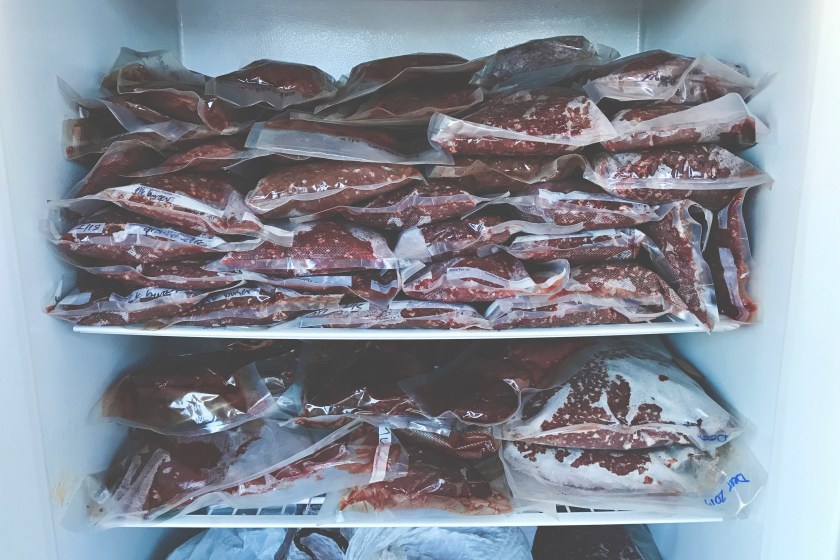
eyecrave productions, Getty Images
According to the U.S. Department of Agriculture, uncooked, frozen venison can be eaten up to 12 months after it is frozen. Frozen ground venison, or ground deer meat, is at its best quality if eaten before three months, while venison roasts and deer steaks are tastiest before they reach the six-to-nine-month mark.
But this doesn't mean you should toss your frozen deer meat on day 366. If stored properly, frozen venison can last much longer. It's less a case that the meat will go bad after 12 months, and more so that stored venison tends to lose flavor and quality over time. After putting all that hard work into bagging a deer, you want to eat your venison cuts at their peak deliciousness.
If you are eating meat that's older than one year—or, really, anytime you're eating meat—make sure to check the meat for quality before cooking it up. Chest freezers are wonderful tools, but they can break down or can start thawing if the power goes out; this can all make your frozen deer meat go bad a lot faster than in 12 months.
Any meat that has started to turn brown or has an off odor should be thrown out. Also, check for any freezer burn or excessive ice crystals. You can still eat meat that is freezer-burned; however, it just may not have the same taste, since freezer burn draws out moisture and flavor.
How to Properly Store Frozen Deer Meat

Getty Images, eyecrave productions
After you've field-dressed your deer and processed it, start preparing the meat for freezing. You'll want to clean the cuts and trim off any fat, which goes rancid a lot more quickly than meat. Portion the raw meat into meal-size sections (about 1 pound).
A variety of materials can be used to wrap deer meat cuts before freezing: heavily waxed paper such as butcher paper, aluminum foil, plastic wrap, freezer bags, and zip-close plastic bags. The important thing is to wrap the meat tightly and remove as much air from the bag as possible before sealing. This will keep the meat fresher and help prevent freezer burn.
We recommend getting a vacuum sealer and vacuum-sealed bags, then vacuum-sealing any wild game meat or fish you're freezing for the best results. It removes most of the oxygen from the package, slowing the growth of bacteria.
After wrapping the packages, make sure you label them with a permanent marker and add the date. If you're cleaning out your chest freezer a year later, you'll want to know what you're pulling out of it!
Put the venison in the freezer. Make sure that the packages are spaced out to allow ample air circulation for freezing; if they are stacked too tightly, they may not freeze all the way through or will freeze unevenly. Once they're frozen solid (24 hours later), you can stack them tightly. When you're freezing deer meat, make sure the freezer is at zero degrees Fahrenheit or colder for the best, safest results.
Always defrost venison in the refrigerator or microwave, not at room temperature.
Yes, if properly frozen, deer meat is good after two years. It will not be as tasty as fresh deer, but it is still safe to eat. Just make sure your freezer is at zero degrees Fahrenheit or colder, and check the quality of the meat for any spoilage before eating. Yes, 2-year-old frozen deer meat is, by all rights, still safe to eat if it has been frozen properly. Because it is older, it may not be as flavorful as fresher deer. As you are thawing and cooking the meat, be on the lookout for any browning or weird smells. If you notice anything off, don't eat the meat. Yes, even after three years in the freezer, deer meat can still be eaten! Maybe you lost an old package of meat in the bowels of your freezer and are just finding it. Don't despair. Cook it up, and as long as it smells fine, it's good to eat. There may be signs of freezer burn—but this only affects the taste, not the safety, of the venison. If properly vacuum-sealed, frozen deer meat can last indefinitely! Vacuum-sealing removes most of the oxygen from the meat, slowing the growth of bacteria. Again, make sure the meat has been kept at zero degrees Fahrenheit, and use your best judgment when cooking it.FAQs About Frozen Deer Meat
READ MORE: 6 Wild Game Chefs You Should Follow for Tasty Recipes
